I’m off to New Delhi with my mom and my aunt in the coming months, but I’m wondering about the best time to visit New Delhi to avoid mosquitos, so when is mosquito season in New Delhi?
In New Delhi, the highest mosquito activity is from June through October. This is when rainfall is the highest and mosquitos breed. In the months following, cases of dengue fever are at their highest levels.
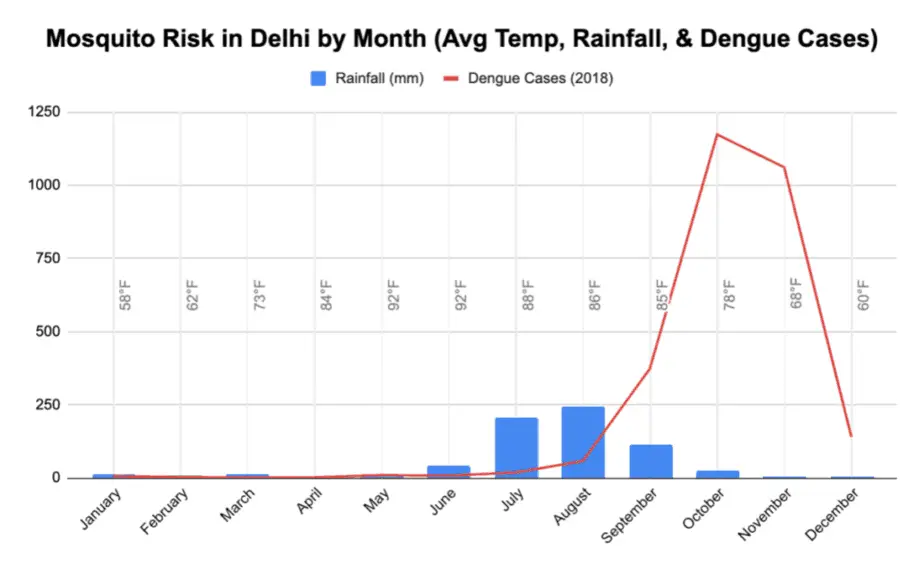
| AVG TEMP* | RAINFALL (mm)* | DENGUE CASES (2018)** | MOSQUITO RISK | |
| January | 14°C (58°F) | 15 | 6 | Low |
| February | 17°C (62°F) | 10 | 3 | Low |
| March | 23°C (73°F) | 14 | 1 | Low |
| April | 29°C (84°F) | 3 | 2 | Low |
| May | 34°C (92°F) | 11 | 10 | Low |
| June | 34°C (92°F) | 42 | 8 | Low |
| July | 31°C (88°F) | 205 | 19 | Moderate |
| August | 30°C (86°F) | 246 | 58 | High |
| September | 29°C (85°F) | 112 | 374 | High |
| October | 26°C (78°F) | 26 | 1,174 | Very High |
| November | 20°C (68°F) | 3 | 1,062 | Very High |
| December | 16°C (60°F) | 6 | 141 | High |
**Source: Number of cases as reported by South Delhi Municipal Corporation (SDMC) in 2018
If you’re visiting New Delhi, then I recommend visiting in the winter time when the temperatures are mild and there is less rainfall… and mosquitos. But there are other good times and if you’re planning a trip and want to avoid mosquitos, then check out the details below.
When Is Mosquito Season in New Delhi?
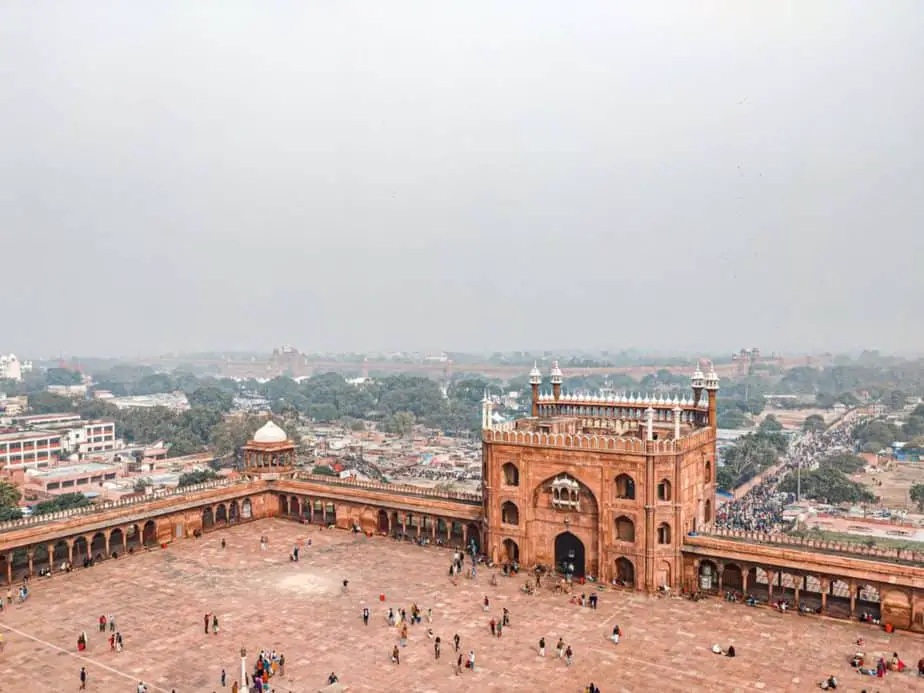
Mosquitos are most active when it rains, and rain starts falling in June in New Delhi. July, August, and September have the most rainfall. October gets a moderate amount.
Then November through May, New Delhi gets very little rainfall.
Cases of the vector-borne disease, Dengue Fever, start to climb in July. Then steadily climb through August and September, before hitting their highest levels in October and November. They start to fall in December, yet there are still a significant number of cases reported.
From this data, it looks like, June through December has the highest mosquito activity in New Delhi.
Therefore, if you’re planning a trip to New Delhi like I am, then January through May would be your best months to avoid mosquitos.
I’m planning a trip with my mom and aunt in February or March, so we should be pretty safe from these annoying and perhaps disease-ridden creatures.
However, I still want to be prepared, so let’s take a look at some other stats that I’ve researched and ways to prevent mosquito bites in India.
Is A Mosquito-Borne Disease Likely To Happen To Travelers in India?
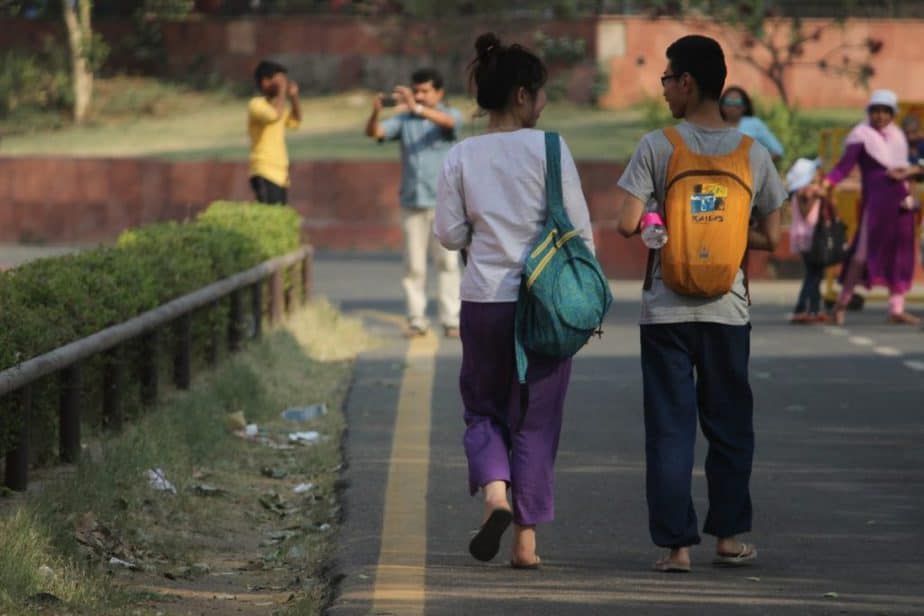
I’ve been in India almost a year, and I have not gotten malaria, dengue fever, chikungunya, or any other mosquito-borne diseases, thank the heavens.
Let’s check out some stats that might help us determine if this is a big problem to consider:
Dengue Fever Statistics
In 2018, there were 2,798 dengue fever cases reported in Delhi (by the SDMC). There were 4 deaths. There are approximately 29,600,000 people in Delhi, which doesn’t include travelers, so if you were to live in Delhi 365 days a year, you’re odds of getting dengue fever are… 0.00945%.
Let’s say you’re traveling in Delhi for 30 days. From those numbers, your odds of getting dengue fever would be… 0.0007875%. That’s super low!
Out of 100,000 travelers who stay in Delhi for one month, less than one (0.78) will get dengue fever.
If my math is correct, the odds are extremely low it’s going to happen to you.
The Chief Minister of Delhi has stated some other statistics about dengue fever:
- In 2015, there were 15,000 cases of dengue fever
- In 2017, there were 4,704 cases of dengue
- In 2018, there are 2,798 cases of dengue
In the coming years, dengue fever may be even less. The city has been taking preventative measures. For instance, they now use a fish that eats mosquito-larvae to help them kill off the bugs before they hatch.
Weird fact: Gambusia is a fish that can eat 300 mosquito larvae each day (yummy!) and the government will drop them in standing water, lakes, and ponds.
The government also tracks mosquito-breeding ground and found them in 38,512 households in 2019. Yikes!
What about Malaria and Other Mosquito-Borne Diseases?
In 2017, mosquito-borne diseases affected 9,271 people in Delhi.
Across India, it looks like the cases of malaria dropped by 50% as well. According to data from the National Vector Borne Disease Control Programme*** (say that 10 times fast, haha)… there were:
- 12.6 million cases of malaria in 2016. 22,786 deaths were reported from malaria.
- 9.6 million cases of malaria in 2017. 16,733 deaths were reported from malaria.
- 5.1 million cases of malaria in 2018.
***You can nerd out on malaria stats by reading more in this article.
If you’re just learning about these illnesses for the first time, like I was before I went to India, here are some basic details…
What Diseases and Illnesses Are Caused By Mosquito Bites?
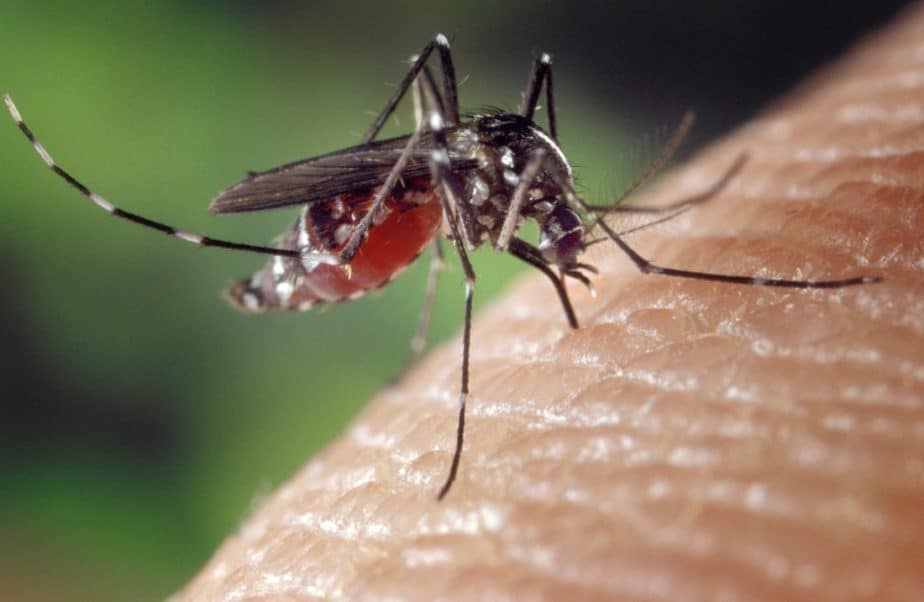
Dengue Fever
It’s a viral infection caused by bites from the tiger mosquito. Mosquitos can spread it quickly by sharing the disease to its next victim. If you get hit with this illness, then you’ll experience symptoms like:
- Body aches
- Fever
- Rash
- Joint pain
Can you prevent dengue fever? You can NOT prevent it aside from avoiding mosquito bites. Tiger mosquitos mostly bite during the day, so stay vigilant at all times. I’ll cover the best ways to prevent mosquito bites below.
Malaria
Malaria is a protozoan infection (parasites) that you can only get from the female Anopheline mosquito. They only bite at night, mostly after the monsoon season.
Symptoms of malaria include:
- Diarrhea
- Nausea
- Vomiting
- Headaches
- Sweating
- Fever
- Chills that cause you to shake
- Pain in muscles
- Convulsions
- Bloody stools
- Anemia
Malaria is a serious business, so please consult your doctor ASAP if you think you have it.
Can you prevent malaria? You can get anti-malarial pills for your trip and many travelers do. Doxycycline, mefloquine, atovaquone are some of them but please see your doctor.
Unfortunately, there are side effects to the antimalarial pills, which coincidentally resemble the side effects of malaria: nausea, vomiting, stomach pain, headaches, insomnia, dizziness, maybe even anxiety and depression.
Again, please consult your doctor before coming to India to learn what’s best for you.
Chikungunya, Zika, West Nile, Yellow Fever and more…
Similar to malaria and dengue, there are plenty of other mosquito-borne diseases to keep an eye out for. Fortunately, there is an even lower chance of getting these diseases than the more popular malaria and dengue.
Chikungunya is spread by the tiger mosquitos, which also spread dengue fever. There were 165 cases reported in Delhi in 2018, whereas there were over 2,700 cases of dengue.
Can you prevent chikungunya and other mosquito-borne disease? There is no vaccine or pill that will prevent you from getting this. Follow my tips on preventing mosquito bites below…
How To Prevent Mosquito Bites on Your India Trip
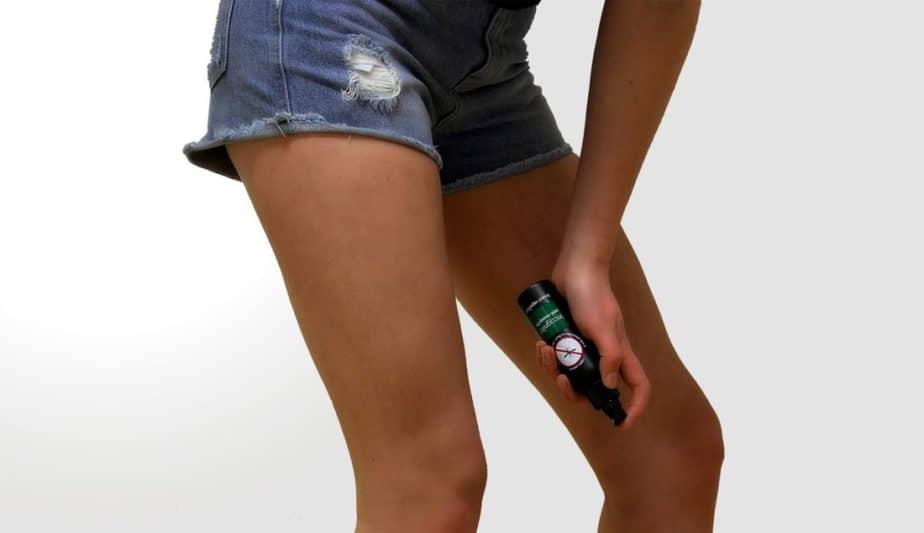
There are effective ways to prevent mosquito bites if you have to travel New Delhi during mosquito season. Here are the best ways:
Use A Repellent With Deet
Wearing mosquito repellent with about 20-30% DEET is the most effective way to prevent getting bitten by mosquitoes.
Consumer Reports did a study and found that the best mosquito sprays can prevent mosquito bites for up to 6 hours. If you try to use mosquito sprays without DEET, then most will fail to work within 30 minutes.
Travel Tip To Prevent Mosquitos: Bring DEEP mosquito repellent from home.
I can’t find mosquito repellent with DEET in my local stores, and there is one brand on Amazon that sells repellent with DEET. It has 40% which is a bit more than I need. More DEET is NOT better.
Is DEET safe? The EPA did a review in 1998 and 2014 and found there were “no risks to human health, non-target species or the environment.” They went on to say, “We continue to believe that the normal use of DEET does not present a health concern to the population, including children.”
-EPA
Consumer Reports found that the best DEET mosquito repellents were:
- Total Home Woodland Scent Insect Repellent with 30% DEET.
- OFF! Deep Woods Insect Repellent VIII Dry with 25% DEET.
Picaridin is also an effective repellent, with some brands: Sawyer Premium Insect Repellent with 20% picaridin tested the best in Consumer Reports study.
If you insist on a natural spray, Lemon Eucalyptus was the most effective ingredient to keep mosquitos away. Consumer reports found that the best brand was: Repel Plant-Based Lemon Eucalyptus.
For more details on the Consumer Reports study and avoiding mosquito bites in India, please read my article.
Wear Long-Sleeved Light-Colored Clothing
Wearing long-sleeved clothing when it’s hot in India may sound absurd, but it’s basic common sense if you want to avoid mosquito bites. If you look at the Delhiites, you’ll see most of them were long pants and long-sleeved shirts all year round.
Mosquitos are attracted to dark colors. Maybe because when they are hunting as the sun goes down, a dark-colored shirt will stand out more against the sky. Therefore, wear light grey or white t-shirts.
I love these light grey merino travel t-shirts (check the price on Amazon here). I wear them almost every day, sometimes for days at a time. They are short-sleeved, but you can find long-sleeve versions (check the price on Amazon here).
Avoid Mornings and Evenings
Direct sunlight can dry up most mosquitoes and kill the little buggers, which is why most species of mosquitoes hunt in the morning and at night.
When I’m sitting outside in an open-air restaurant for breakfast or dinner, enjoying a delicious chai, I’m sure to wear mosquito spray. The restaurants will sometimes burn mosquito repellent coils, which do seem to work a little… although they smell terrible and watch your feet, sometimes they set them under the tables.
When I’m sitting on my porch as the sun goes down, the mosquitoes are vicious out there.
Avoid Standing Water
Standing water is where the magic happens in the mosquito world… “hey, you come to this puddle often?” 😏😘🦟🐣
This is why you can see an uptick in dengue fever cases during monsoon season.
In the summer, I barely notice any mosquitos. It’s so hot. In the winter, in Delhi, it gets cold too, with average temperatures as low as the 40s°F (under 10°C). You will see far fewer mosquitos then as well.
However, local Delhi residents say you still will see mosquitos in the bathroom or shower.
Book a Hotel with a Mosquito Net
Your best bet to prevent mosquitos that bite at night (the malaria-causing ones) is to get a hotel with a mosquito net. Or bring your own mosquito net.
You can look for details in your hotel on apps like my favorite Booking.com. I will email them ahead of time to make sure.
A secondary preventative measure is to keep the fan on at full-blast.
The fans in Indian hotel rooms are very strong, they can make a wind tunnel look like a gentle breeze 😉 I turn that thing up to full-blast and cover-up, which usually prevents most mosquito bites.
How Can You Prevent Mosquito Bites, If You’re Staying in India for a Longer Time Period?

If you rent a house in India like I am, and want to prevent mosquitoes in ways that a mobile traveler can NOT, here are some options that have worked for me:
- Mosquito Bat: It looks like a tennis racket combined with one of those electric mosquito zappers you will see on someone’s porch. You wave it towards the flying mosquito, push a button, and 3500 volts will ZAP that sucker to heaven… or its next life. 🙂 (Check the price on Amazon here).
- Mosquito Net: Get one for your bed. If you’re like me, you can get one that has wires within and tucks into your bed. I cannot attach it to my walls because it’s solid concrete. If you can attach it to your walls you can get one to hang (check the price on Amazon here).
- Mosquito Screens: I have screens on my windows, but mosquitos are like Tom Cruise in Mission Impossible… they must get suited up in all spandex and come in through a vent because I will have herds of them if I leave my windows open. That’s why I want to use extra mosquito screens with smaller holes like this one (check the price on Amazon here). I like to keep my windows open during the cooler months and listen to the bugs, it’s like a jungle here. This will keep out the mosquitoes.
Related Questions:
What is the Best Mosquito Repellent for India?
Consumer Reports found that Total Home Woodland Scent Insect Repellent with 30% DEET and OFF! Deep Woods Insect Repellent VIII Dry with 25% DEET were the best. Sawyer Premium Insect Repellent with 20% picaridin also works well. Repel Plant-Based Lemon Eucalyptus is the best natural spray option.
When Are Mosquitoes Most Active in India?
During and after the monsoon season. In Delhi, Agra and Jaipur, this means mosquitoes are most active in June through December. In Goa, mosquitoes are most active in June through October. In Chennai, this means October through January. In Varanasi, from July through November. In Kerala, from June through January.
How Bad Are Mosquitoes in India in February?
In North India, there are very few mosquitoes because this is one of the coldest months and it has been a few months since the monsoon season. In South India, you will see many mosquitoes because the temperatures are warm in winter and the monsoon season is later in the year.
Are There Mosquitoes in Delhi?
Yes. There were 2,798 cases of dengue fever in Delhi in 2018, and dengue fever is caused by getting bit by an infected mosquito.
Is There a Mosquito Breeding Season in India?
Mosquitos will breed during monsoon season, which occurs from June through October in North India. In South India, monsoon falls later in September through November so the mosquito breeding season occurs during this time.

